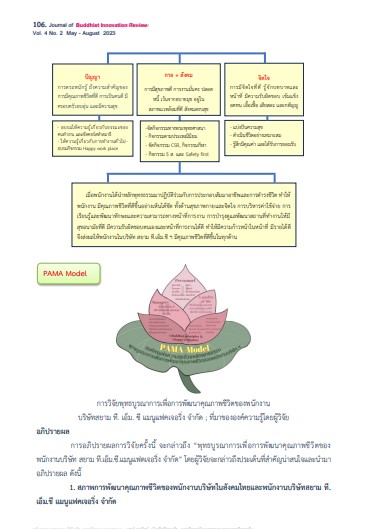A Buddhist Integration for Improve the Quality Of Life Of Employees Siam T.M.C Manufacturing Co., Ltd.
Main Article Content
Abstract
The objective of this research is (1) to study the condition for improving the employees’ quality of life in Thai society and at Siam T.M.C. Manufacturing Co., Ltd. (2) to study the Buddhist principles (Buddhadhamma) for work and for happy workplace to improve the employee’s quality of life at Siam T.M.C. Manufacturing Co., Ltd (3) to propose the integrated Buddhist principles to improve Siam T.M.C. employees’ quality of life. This research is qualitative with in-depth interviews and descriptive compilation. The research found that improving the company employees’ quality of life is important to make the employees happy at work. Applying the integrated Buddhist principles into the employees’ daily lives enables confidence in carrying out activities. In addition, it also leads to the utmost work benefits: being successful in job duties, being able to maintain oneself in discipline according to company’s disciplinary regulations. How successful it will be depending on the attention of the employees to each aspect, transparency, honesty, prudence, commitment to morality, culture and law, service with professional ethics and respect for the dignity and value of other people. Happily working for the benefit of employee development through training is an important process in transforming the employees’ behavior. The model should be briefly described.
Article Details

This work is licensed under a Creative Commons Attribution-NonCommercial-NoDerivatives 4.0 International License.
เรื่องลิขสิทธิ์/เป็นความคิดเห็นของผู้เขียน
References
เอกสารอ้างอิง :
หนังสือ :
สำนักนายกรัฐมนตรี. แผนพัฒนาเศรษฐกิจและสังคมแห่งชาติ ฉบับที่ 12 (พ.ศ. 2560 –2564). ราชกิจจา-นุเบกษา. เล่ม 122 ตอนที่ 115 ก.
อัชฌม ชื่นบุญ และคณะ. (2562). ปัจจัยที่ส่งผลต่อความสุขในการทางานของบุคลากรในโรงพยาบาลเซนต์เมรี่. (รายงานการวิจัย). นครราชสีมา: ม.ป.ท.
พระมหาสุทิตย์ อาภากโร (อบอุ่น) และเขมณัฏฐ์ อินทรสุวรรณ. (2561). ตัวชี้วัดความสุข: กลยุทธ์การสร้างและการใช้เพื่อชุมชนเป็นสุข. กรุงเทพมหานคร:
เจษณี สุขจิรัตติกาล (แปล), (2547). ความสุขมวลรวมประชาชาติ มุ่งสู่กระบวนทัศน์ใหม่ในการพัฒนา. ศูนย์ภูฐานศึกษา (เรียบเรียง), กรุงเทพมหานคร : เฟื่องฟ้า.
วิทยานิพนธ์ :
พระศุภชัย คุตฺตสีโล (ฝั้นยะ). (2560). การพัฒนาองค์กรแห่งความสุขของวิทยาลัยสงฆ์ลาพูน จังหวัดลาพูน. พุทธศาสตรมหาบัณฑิต สาขาวิชรัฐประศาสนศาสตร์ บัณฑิตวิทยาลัย มหาวิทยาลัยมหา-จุฬาลงกรณราชวิทยาลัย.
พระวิจิตร มหาวิริโย. (พฤษภาคม 2561). แนวทางการเสริมสร้างคุณภาพชีวิตเพื่อการเข้าถึงสันติสุขตามหลักมรรค8: กรณีศึกษาศูนย์พัฒนาศาสนาแคมป์สนจังหวัดเพชรบูรณ์. วารสารสันติศึกษาปริทรรศน์ มจร. 5(ฉบับพิเศษ); 216-226.
นรัญญา ธนกุลภารัชต์, (2547). การศึกษาเชิงเปรียบเทียบความสุขของพุทธศาสนานิกายเถรวาทกับสุขนิยมทางจริยศาสตร์. ศิลปศาสตรมหาบัณฑิต. บัณฑิตวิทยาลัย : มหาวิทยาลัยเกษตรศาสตร์.
สื่ออิเล็กทรอนิกส์ :
สถาบันบริหารและจิตวิทยา. (ออนไลน์) การพัฒนาทรัพยากรมนุษย์ในภาวะวิกฤต. แหล่งค้นคว้าจาก www. adecco.co.th. (สืบค้นวันที่ 12 พฤษภาคม 2560)
ประชาชาติธุรกิจ. วาง 5 แนวทางสร้างความผูกพันองค์กร [ออนไลน์]. แหล่งค้นคว้าจาก www. prachachat.net/news. (สืบค้นวันที่ 2 เมษายน 2566)
Reference :
Books :
Office of the Prime Minister. National Economic and Social Development Plan, Volume 12 (2017-2021). Royal Gazette. Volume 122, Section 115 A.
Atcham Chuenboon et al. (2019). Factors affecting job satisfaction of personnel at St. Mary's Hospital. (Research report). Nakhon Ratchasima: [Publisher unknown]
Phra Maha Sutit Apakaro (Obun) and Khemanat Intharasuwan. (2018). Happiness Indicators: Strategies for Creating and Using Them for a Happy Community. Bangkok:
Jetsanee Sukchirattikarn (translator), (2004). Gross National Happiness: Towards a New Paradigm in Development. Bhutan Studies Center (edited), Bangkok: Fuangfah.
Thesis :
Phra Suphachai Kuttasilo (Fanya). (2017). The Development of a Happy Organization at Lamphun Buddhist College, Lamphun Province. Master of Public Administration Thesis Graduate School, Mahachulalongkornrajavidyalaya University.
Phra Vichit Mahaviriyo. (May 2018). Guidelines for Enhancing Quality of Life for Achieving Peace According to the Eightfold Path: A Case Study of the Camp Son Religious Development Center, Phetchabun Province. Journal of Peace Studies
Mahachulalongkornrajavidyalaya University, 5(Special Issue); 216-226.
Naranya Thanakulpharat, (2004). A Comparative Study of Happiness in Theravada Buddhism and Hedonism in Ethics. Master of Arts Thesis. Graduate School: Kasetsart University.
Electronic media:
Institute of Management and Psychology. (Online) Human Resource Development in Crisis Situations. Available from www.adecco.co.th. (Accessed May 12, 2017)
Prachachat Business. Five Guidelines for Building Organizational Commitment [Online]. Available from www.prachachat.net/news. (Accessed 2 April 2023)


